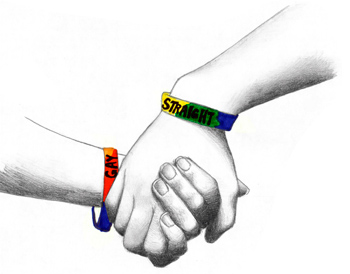*To protect his privacy, the name of Kristy’s friend has been changed.
At my school same-sex couples are welcome to every school dance. The administration is trying to create an open-minded environment, but the reality is that not all students at my school are tolerant. There are guys who call my gay friend Tom* offensive things like “you stupid, sick fag” whenever they see him. He told me that even though now he doesn’t care what “a bunch of idiots” think, the attacks used to make him sad. But during high school he decided he wouldn’t let the words hurt him anymore. Whenever I hear stuff like this I think, “Why is there such hatred in this world?”
We’re seniors now, but people have been picking on Tom since middle school because of his high-pitched voice and how he giggles a lot. I was frustrated by how he was treated. Gay or straight, everyone can be hurt by words and we all deserve kindness and respect. I eventually realized that if I didn’t stand up for gay rights, then I’d be just as bad as those who make fun of people who are gay. So sophomore year I signed up for my school’s Gay-Straight Alliance—a club for gay and straight students to combat the homophobia gays face.
When my best friend, Angie, and I walked into our first meeting there were about 15 people writing on pieces of paper. The advisor, Dr. Brown, told Angie and me that everyone was writing questions that they were too embarrassed to ask out loud. I was surprised that kids were embarrassed to ask questions. Since it’s common at my school to hear students use “fag” and “that’s so gay” as an insult, it seemed like it took courage to join GSA. After the other students wrote their questions, Dr. Brown put them in a box and pulled out many that asked how someone should come out to their parents.
Everyone sat in an awkward silence for about a minute shifting their gazes from the ceiling to the floor. I said that even though I’m straight, I thought that you should tell your parents, but only if you’re prepared for the consequences, like getting kicked out of the house. It would be better to know if your family would accept you for who you are. No one said anything for a minute.
A boy shared his fear of coming out
Then another student said that he was almost certain his parents wouldn’t accept him when he came out. But he was tired of keeping his secret and decided that he would tell them anyway because he had learned to accept himself. (A few months later, after he came out, he shared how he was surprised that his parents were supportive and accepted him for who he was.)
A girl then shared that she knew her parents wouldn’t understand because of their religion. She told us her mom referred to homosexuality as “disgusting.” She would just nod when her parents expressed their views on homosexuality, and would sometimes later cry in her room. When I heard her story, I understood why she didn’t come out to her parents and realized that coming out was more complicated than I had thought.
I thought it was only ignorant kids and teens who openly discriminated against homosexuals. But during a meeting at the beginning of junior year, a club member’s dad talked about the obstacles he had to overcome as a gay man. He shared what it was like having to quit his job because people gossiped about his sexuality. After he came out, some of his friends and relatives called him “faggot” and “homo” and no longer welcomed him in their homes. He said he felt like he was treated as if he had a deadly disease. But he endured the harassment because his immediate family supported him. I thought adults were more mature, but hearing about their cruelty made me tear up.
I recruited others to join
I think that since society is still not as accepting as it should be, I need to do whatever I can to promote tolerance. One day in P.E. some friends and I were talking about how people at school weren’t open-minded about sexuality. I brought up GSA and explained how it’s a great place to stand up for equality and four of them, two who are straight and two who are bisexual, joined.
The students at my school need to learn the tolerance our GSA promotes. When one guy says to another that he looks good, he feels like he has to immediately say, “No homo.” When I hear someone say that, I tell them, “Please don’t say that. It’s offensive and I’d appreciate it if you didn’t say things like that. Thanks.” I don’t explain to them why it’s offensive because I don’t think they would listen to me. I know that I may not be able to make them believe in gay rights the way that I do, but I still want them to stop saying hurtful things.
I know that some people think I’m a lesbian because I’m in GSA and also probably because I hug my female friends and kiss them on the cheek, which is how everyone in my family greets people. But I don’t care because I think it’s important for people to stand up for what they believe in, regardless of what anyone else might think. When there are class discussions related to same-sex marriage or people’s rights, I make sure to say everyone is entitled to equality. I want to help make sure that everyone is accepted because we all deserve it.
